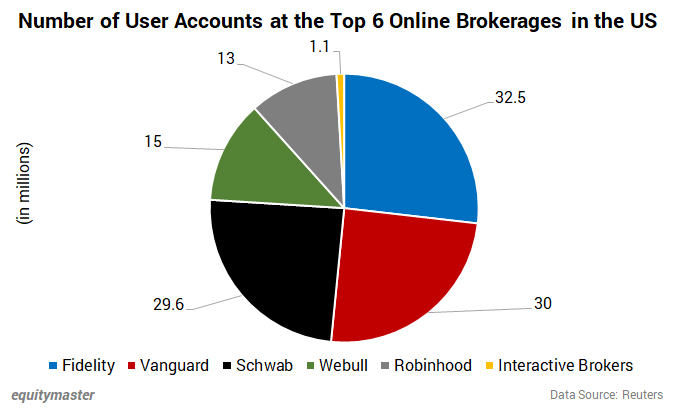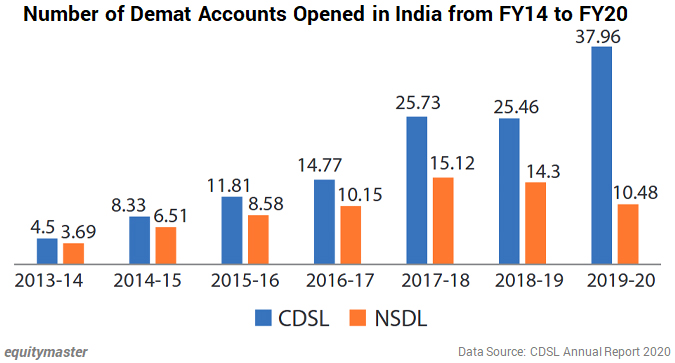India's Third Giant Leap
This Could be One of the Biggest Opportunities for Investors
- Home
- Views On News
- May 22, 2021 - Should 13-Year Olds have Demat Accounts?
Should 13-Year Olds have Demat Accounts?

In an effort to capture the next generation of investors, Fidelity Investments (US) has launched a commission-free brokerage account for 13 to 17-year-olds that lets them trade stocks on a mobile app, as well as save and spend using a debit card.
It won't be long before this trend hits India. Here's how you can approach it...
First, How do these Youth Accounts Work?
The youth accounts, the first ever as per the company, are available to teens whose parents or guardians, who can monitor the accounts, are Fidelity customers.
Teens can access Fidelity's educational tools and can buy and sell domestic stocks, including through fractional shares, as well as most exchange-traded funds, through the accounts.
When the investor turns 18, the account transitions to a standard brokerage account that comes with more choice and flexibility.
Why has the Company Introduced these Accounts Now?
Fidelity says that the account is positioned as a way for parents to have conversations around money with their children but it's only the latest step in a broad push by the industry to draw more first-time investors into the market.
Young investors have flooded into the market in the US since October 2019 when large brokers such as Fidelity and Charles Schwab dropped their trading commissions and start-ups such as Robinhood courted young adult traders.
While Robinhood offers a trading experience with social interaction seeped into its DNA, an entertainment ecosystem has risen up alongside Robinhood.
TikTok videos under #robinhoodstocks have millions of views while communities of at-home investors use online forums such as Reddit's WallStreetBets to join forces on stock-buying campaigns.
Younger investors in their 20s have also been taking the market by storm, with trading volumes rising across brokerages.
As per an article in Reuters, the top six online brokerages accounted for over 100 m accounts, according to the most recent data.
Apex Clearing, which helps facilitate trades for brokerages, told Reuters around 1 m of the new accounts it opened last year belonged to Gen Z investors, with an average age of 19.

How Does This Compare to the Retail Investor Scenario in India?
Factors such as digitization and growing awareness about equities have also pushed investors in India to shift their savings from traditional instruments such as gold, real estate and bank deposits to alternatives like stocks.
Younger investors as well as investors from Tier-2 and Tier-3 cities have adapted to the digital journey.
Additionally, as markets made a robust rally in FY21 after the crash following the lockdown in March last year, appetite for stock trading has grown.

Indian investors opened a record 14.2 m new demat accounts in FY21, as the global pandemic and business disruptions opened up new investment opportunities.
In contrast, 4.9 m demat accounts were opened in FY20, with a three-year average of 4.3 m in the three fiscal years starting FY18, data from National Securities Depository (NSDL) and Central Depository Services (CDSL) showed.
Can Teenagers Invest in the Stock Market in India?
They can. Contrary to what one may assume, there is no minimum age to invest in the Indian stock market. Hence, both adults and minors can have demat accounts that enable stock market trading.
If one is under 18 years of age, the demat account can be opened by the parents/appointed guardian once all important documents are submitted.
Does this Mean Your Teenager could be the Next Warren Buffet?
Sure. From a financial literary perspective, investing early through apps like these bring a new dimension to learning especially understanding the magic of compound interest and the advantages of riding out volatile markets.
However, there are investment dangers inherent in stock trading apps. The instant gratification of stock trading smartphone apps can be downright addictive, triggering risky behaviour in teenagers and driving compulsive trades.
On the other hand, options and futures trading can be tricky even for experienced and sophisticated investors, but it can be downright devastating for newcomers to the market.
Especially, markets they don't fully understand.
Moreover, academic research has shown that self-guided investors do worse the more actively they trade but most of these studies were done before zero brokerage commissions.
Markets have also gotten faster and more competitive, meaning anyone trading from a phone app without any expertise is trying to outwit increasingly sophisticated pros on the other side of the bet.
But isn't Encouraging More Investment a Good Thing?
It is. With low-interest rates and rising inflation, the more traditional means of saving are effectively defunct which makes investing in the market more obvious.
Besides, with the help of technology, most of the barriers to stock market investments have been minimized, or totally eliminated by the online world.
However, with trading commissions now at zero for many brokerage firms and trading apps, the desire to constantly buy and sell can be overwhelming.
Whether you're a teenager, a brand-new investor or an experienced builder of wealth, the new generation of trading apps come with a world of opportunity and no small amount of risk.
If you're thinking of opening an account for your child with one of these platforms, it's important that your kid educates herself, and does her homework before logging on. And even then you need to be there to provide the calming influence.


Equitymaster requests your view! Post a comment on "Should 13-Year Olds have Demat Accounts?". Click here!
Comments are moderated by Equitymaster, in accordance with the Terms of Use, and may not appear
on this article until they have been reviewed and deemed appropriate for posting.
In the meantime, you may want to share this article with your friends!